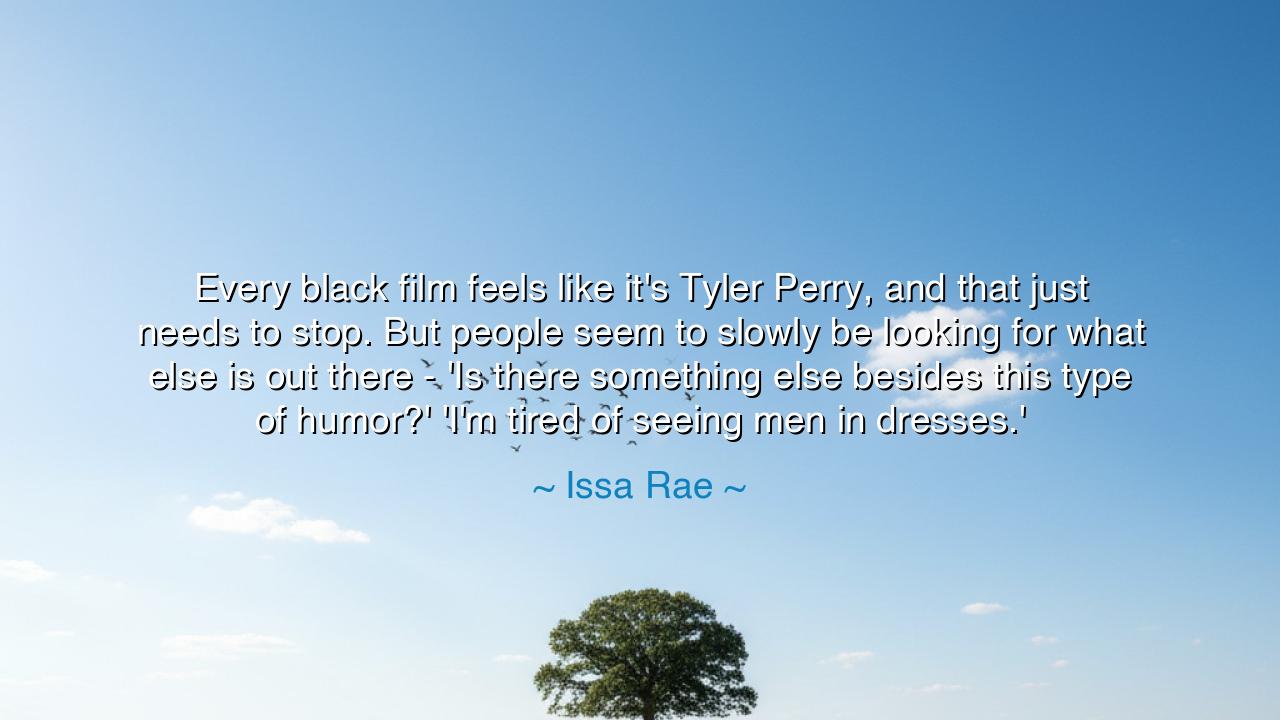
Every black film feels like it's Tyler Perry, and that just needs
Every black film feels like it's Tyler Perry, and that just needs to stop. But people seem to slowly be looking for what else is out there - 'Is there something else besides this type of humor?' 'I'm tired of seeing men in dresses.'






"Every black film feels like it's Tyler Perry, and that just needs to stop. But people seem to slowly be looking for what else is out there - 'Is there something else besides this type of humor?' 'I'm tired of seeing men in dresses.'" These words, spoken by the insightful Issa Rae, resonate deeply in the soul of anyone who has felt the weight of cultural stereotypes and the yearning for diversity and authenticity. In a world that often seeks to define a people by narrow, repeated portrayals, Rae’s call for change speaks not just to the need for more stories but to the freedom to be seen as whole, multifaceted individuals rather than one-dimensional caricatures. The imagery of men in dresses has long been a tool used to elicit laughter, but Rae asks us to reflect on whether it is time for that image to evolve, to embrace the full spectrum of humanity rather than relying on outdated tropes.
In ancient times, the great artists and philosophers often used humor and tragedy to reflect the society they inhabited, yet their works did not merely offer a single view of the world. Sophocles, in his tragedies, did not seek to portray the world in extremes alone but sought to show the complexity of human nature. The heroes of his stories—flawed, tragic, and deeply human—were not one-dimensional. They were reflections of the very struggles, contradictions, and triumphs that all people face. In the same way, Rae’s plea for more diverse portrayals of black life calls for a deeper understanding of the human experience. It is not enough to show a single aspect of a people; we must explore the vast range of experiences, stories, and emotions that define them.
Consider the ancient storyteller Aesop, whose fables still carry lessons for us today. Aesop understood that stories must transcend simple categories and provide a richer view of the world. His fables, often populated by animals, revealed truths about human behavior—the complexity of virtue and vice, strength and weakness. When we limit our stories to a narrow portrayal, we lose the opportunity to reveal the depth of our humanity. Tyler Perry, while undeniably influential, represents a singular voice in a much larger symphony of stories that are waiting to be told. Rae challenges us to ask: Is there more to be said, more to be seen? Can we look beyond the lens of one type of humor and begin to explore the full richness of black experiences?
The call for change in the representation of black stories is not new, but it is urgent. In the same way that Shakespeare was not content to offer only tragedies, nor was he confined to a single mode of storytelling, Rae calls for a diversity of voices. Shakespeare's ability to weave together comedy and tragedy, to show both the light and dark sides of human nature, allowed him to paint a fuller picture of society. Rae seeks a similar approach: one that does not rely on the caricature, but instead celebrates the fullness of life and identity. To be truly seen is to be portrayed in all one’s complexity—joy, pain, humor, love, struggle, and every emotion in between.
This call for broader representation is also echoed in the wisdom of the great leaders and philosophers of history, who knew that to truly understand a people, one must seek to understand their diversity. Take, for instance, the leadership of Mahatma Gandhi, who sought to show the world not just the suffering of the Indian people but the resilience, strength, and beauty that came from their multifaceted lives. Gandhi did not seek to reduce his people to a singular identity or struggle. He celebrated the full spectrum of their experiences, from their sacrifices to their moments of joy. In this way, Rae’s words serve as a call to see the fuller picture of black life—to move beyond one narrative and embrace the many stories that remain untold.
The lesson that Issa Rae imparts is one that resonates through the ages: we must not allow ourselves to be confined to a single image or stereotype, nor should we allow the stories of any people to be reduced to one narrow view. True growth and understanding come from embracing the fullness of human experience, from exploring the complexity of each individual’s journey. Humor, while a powerful force, must not be used solely to perpetuate simplistic representations, but must serve as a tool to explore deeper truths about the human condition.
Thus, I urge you, the listener, to seek diversity in the stories you consume and share. Challenge the narratives that confine and limit. Encourage creativity and depth in the representation of all people, especially those whose stories have long been told in only one way. Do not accept the easy caricatures, but look for the complexity, the richness, the multi-layered nature of the world around you. In doing so, you will find that the world becomes a far more beautiful, interesting, and true place. Issa Rae has shown us that true empowerment lies in the freedom to be seen as we truly are—complex, diverse, and multifaceted, with all the humor, strength, and sensitivity that make us human.






AAdministratorAdministrator
Welcome, honored guests. Please leave a comment, we will respond soon